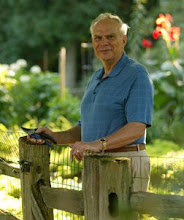Achebe was born in Ogidi, a large Ibo village in Nigeria, in 1930. As his father was a teacher-catechist for the Church Missionary Society, Achebe was raised in a Christian home and educated in a Christian mission school. However, since his grandparents and other relatives followed traditional Ibo tribal practices, he was acutely aware of his Ibo tribal heritage.
Intending to become a doctor, he entered the University of Ibadan and, changing his major to literature, took his B. A. degree in 1953. He read widely in such classical English authors as Shakespeare, Wordsworth, Coleridge, Joyce, Hemingway and Conrad. Appalled by the image of the African people in The Heart of Darkness, he determined that the story of Africa needed to be told by an African and began writing stories on what was to become his signature theme, the conflict between traditional African and Western cultures. Achebe came to the United States in 1972 to teach literature at the University of Massachusetts, and has been a visiting professor in various universities in the New England area.
CHAPTER SUMMARIES
Chapter One introduces us to Okonkwo by contrasting him with his father Unoka. In Chapter Two, when an Ibo girl is murdered by a neighboring tribe, Okonkwo is chosen as an emissary of war to Mbaino, and is given a young boy, Ikemefuna, and a young virgin, in return for peace. Chapter Three contrasts the farming practices of Unoka and Okonkwo, contrasting the father's easy-going ways with his son's intense ambition to become a great farmer. Chapters Four and Five give further insights into family life, showing Okonkwo sternly beating his wives and sons. That Okonkow's manner is not appreciated by the village at large is evident in their rebuke of his manner (26), and the limits of his power are evident is his subservient attitude towards the village priest (31). Chapter Six shows village and family life during the Feast of the New Yam, underscoring the importance of rituals in tribal life.
WHAT IS THE POINT OF THE STRONG CONTRAST BETWEEN OKONKWO AND UNOKA?
Okonkow's ruling motivation is to be different from his father, and most of his characteristics derive from this determination (13). Achebe is showing his people as varied and diverse as any other ethnic group. Africans are not to be defined by stereotypes. Their lives are shaped by psychological reactions that arise from their personal interrelationships, in much the same way as the lives of other people's. Achebe is striving to present an authentic picture. He avoids romanticizing or otherwise idealizing his hero. Okonkow may well be compared to Homer's Achilles, who likewise has many unadmirable characteristics.
The reaction of the village to him (26) shows that others take exception to some of Okonkow's attitudes. His subservience to the village priest, receiving his rebuke (30), also shows that he recognizes certain limitations on his behavior. In spite of his beating and shooting at his wife for a trivial offense, the family has a joyous celebration of the Feast of the New Yam, suggesting their accommodation to him, as well as his compliance, although he does not enjoy such feasting (37).
Chinua Achebe wrote: "The Heart of Darkness projects the image of Africa as 'the other world,' the antithesis of Europe and therefore of civilization, a place where man's vaunted intelligence and refinement are finally mocked by triumphant bestiality." He remarked that Conrad's Africa was a "metaphysical battlefield devoid of all recognizable humanity." Note how his text strives to correct this view, showing the Africans as an intelligent, dignified people with a well-established, well-ordered culture. They have many traits very similar to peoples everywhere.
The Igbo's frequent use of proverbs (7) and the insertion in the text of Igbo terms shows them to be an imaginative people with a keen sense of metaphor. Aristotle remarked that the ability to see metaphor was the essence of genius.

No comments:
Post a Comment